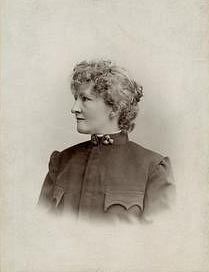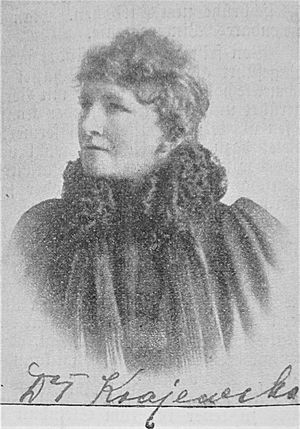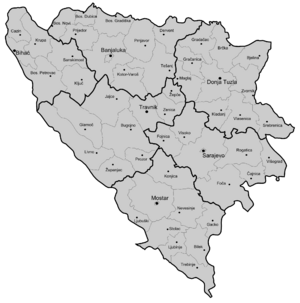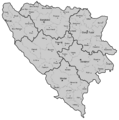Teodora Krajewska facts for kids
Quick facts for kids
Teodora Krajewska
|
|
|---|---|
 |
|
| Born |
Teodora Kosmowska
1854 |
| Died | 5 September 1935 (aged 80–81) Warsaw, Poland
|
| Resting place | Powązki Cemetery, Warsaw |
| Nationality | Polish |
| Alma mater | University of Geneva |
| Occupation | physician, writer, teacher |
| Spouse(s) | Antoni Krajewski (1876–1880, his death) |
| Parents |
|
Teodora Krajewska (born Kosmowska, 1854–1935) was a Polish doctor, writer, and teacher. She was born in Poland, which was then part of the Russian Empire. Later, she became a citizen of Austria-Hungary.
When she was young, Teodora worked as a teacher and wrote stories. In 1883, she surprised her family by moving to Switzerland to study medicine. This was unusual for women at that time. In 1892, the government of Austria-Hungary hired her. She became a public health doctor in Bosnia and Herzegovina.
Teodora Krajewska was one of the first women doctors in Bosnia and Herzegovina and Austria-Hungary. She mostly treated Bosnian Muslim women. She believed these women faced special health issues. Teodora wrote detailed notes about women's health and local customs. These notes were published later in 1989. They show how people at that time often viewed different cultures. Teodora stayed in Bosnia even after Austria-Hungary fell apart. But her eyesight got worse, and she had to stop working in 1922. In 1928, she moved back to Warsaw, Poland, where she passed away.
Contents
Early Life and Education
Teodora Kosmowska was born in Warsaw, a city in Russian Poland. Her family was well-educated. Her father, Ignacy, worked at a school. Her mother, Seweryna, raised their eight daughters. The family was friends with the Skłodowskis. Their daughter, Maria Skłodowska, played with Teodora and her sisters.
After finishing a good girls' school in Warsaw, Teodora passed her teaching exam. She started teaching arithmetic to students. In 1876, she married Ignacy Krajewski, a professor. She then quit her teaching job. The couple often hosted writers and thinkers at their home. These connections inspired Teodora to start writing novels, poems, and book reviews. She also translated books.
A big change in Teodora's life happened in 1881 when her husband died. She went back to teaching at a private school run by her aunts. She also kept writing novels. At that time, young widows in Poland were expected to remarry. But Teodora decided to do something different. She went against her parents' wishes and left Warsaw in 1883. She traveled to Switzerland and started studying at the University of Geneva.
Teodora first studied physiology, which is about how the body works. She became the first female teaching assistant at the university. Then, she began studying medicine. She was also very active in the Polish diaspora community in Switzerland. She even became the President of the Association of Polish Students.
Teodora finished her final exams in 1891. She received an award for her doctoral dissertation in 1892. However, she found she could not get her diploma recognized or practice medicine in Poland. So, when she saw an advertisement from the Austro-Hungarian government, she quickly responded. They were looking for women doctors to work in Bosnia and Herzegovina, which they had recently taken over.
Medical Work in Bosnia
On November 28, 1892, Teodora Krajewska was named a public health doctor for the District of Tuzla. To perform certain procedures, she trained at a clinic in Vienna. At that time, women could not study or practice medicine in Austria-Hungary. But there was a special need in Bosnia and Herzegovina. Muslim women there preferred to be treated by female doctors. So, exceptions were made.
Teodora was one of the first women doctors in Bosnia and Herzegovina and in Austria-Hungary. Seven women doctors were hired to treat Bosnian women. Teodora was one of two Polish doctors among them. Before starting her job, she had to become an Austro-Hungarian citizen. She took over from Anna Bayerová, a Czech doctor. Anna had left because she did not want to treat mostly Muslim women, as her bosses expected. Teodora, however, was happy to take on this important task.
When Teodora arrived in Tuzla in March 1893, the town crier announced her arrival. She was surprised to see "these marvellous Slavic women covered by veils." Teodora quickly learned Serbo-Croatian, the local language. She often rode a Bosnian pony to visit villages high in the mountains. In harsh winters, she had to travel on foot. So many people needed her help that the Austro-Hungarian government soon hired another Polish doctor, Bohuslava Kecková, who worked in Mostar.
In 1896, Teodora spoke at the International Congress of Women in Berlin. She said that Bosnians needed "civilization and progress from the outside." She believed this progress had to be brought "from above."
Teodora was very interested in a bone disease called osteomalacia. In 1900, she wrote a detailed article about it. She claimed that this disease was common among Muslim women in the mountains of Tuzla District. She thought Christian women were never affected. Teodora believed the disease was caused by a "damp climate," "lack of sun," poverty, and poor nutrition. She also linked it to "Muslim customs" like child marriage, women staying indoors, veiling, many pregnancies, and long breastfeeding periods.
In 1901, Teodora was moved to Sarajevo. Another doctor, Jadwiga Olszewska, took her place in Tuzla. As the public health doctor for Sarajevo, Teodora regularly traveled to towns like Foča, Fojnica, and Visoko. Besides her medical work, Teodora taught hygiene in several schools in Sarajevo. There, she became good friends with another teacher and writer, Jagoda Truhelka. She also made friends with some local Bosnians. She preferred Croats but also befriended "progressive Muslims."
Later Years and Retirement
The First World War started in 1914. It began with the assassination of Archduke Franz Ferdinand in Sarajevo, very close to Teodora's home. This war ended the Austro-Hungarian rule in Bosnia and Herzegovina. Most of the wealthy Poles in Bosnia and Herzegovina moved to the new country of Poland. But Teodora decided to stay.
During the war, her eyesight got worse because of cataracts. An eye surgery in Prague was not successful. By 1922, she could no longer work and had to retire.
After living alone with her cat for several years, Teodora decided to leave "the country and the people she knew and loved." She returned to Warsaw, the capital of Poland, in 1927. She found that the city had changed a lot. She no longer felt at home there. In Sarajevo, she had been a well-known and respected person. But in Warsaw, she was just an anonymous old woman. Her sisters and their children lived in southern Poland, and her friends were in Bosnia. Teodora felt lonely and sad. She was already weak and almost completely blind. She made a difficult trip to see Bosnia one last last time. She died in Warsaw on September 5, 1935.
Her Diary
Teodora Krajewska left behind many reports and a detailed diary. When she was old, she gave these writings to her friend Zofia Grabowska. Teodora's nephew, Zbigniew Danielak, edited her diary. It was published in Poland in 1989. The original diary is kept in a special library called the Ossolineum. Parts of it were translated into Serbo-Croatian by the Bosnian writer Marina Trumić.
Teodora's detailed reports about Muslim customs show the common ideas of her time. She wrote that Muslims in Bosnia and Herzegovina were less intelligent and less civilized than their Christian neighbors. She judged different groups by how "progressive" their national movements were. She called Serbs "extraordinarily intelligent" and Croats "average." She saw Bosnian Muslims as a "superfluous and foreign element." However, reports from her colleagues in Bosnia, including Bohuslava Kecková, disagreed with Teodora's writings. They did not find a link between a person's religion and their intelligence.
Images for kids
 | Victor J. Glover |
 | Yvonne Cagle |
 | Jeanette Epps |
 | Bernard A. Harris Jr. |






